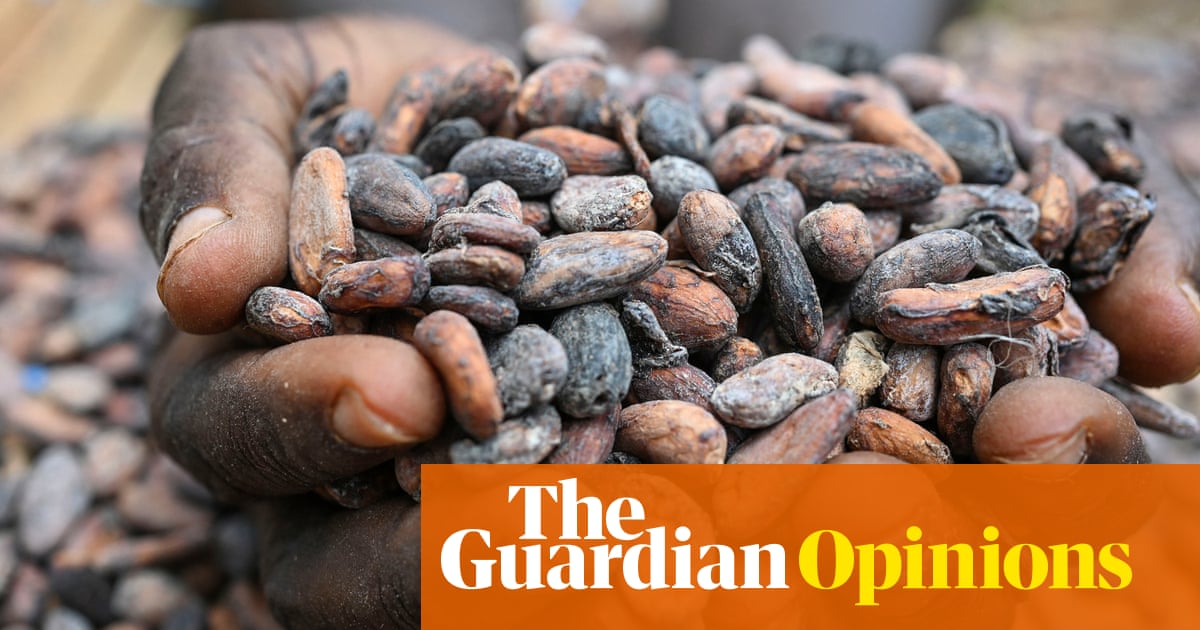
The small indulgence of chocolate is becoming a more costly one. Soaring prices for cocoa beans recently hit a record $12,000 a tonne: roughly four times last year’s price. Many think they will go higher. That means smaller or more expensive bars and reformulated recipes for many consumers, and may put out of business small specialist producers. Yet it is bringing little reward to struggling growers.
The immediate culprit is a bad harvest in west Africa – which produces 70% of the world’s beans – reflecting El Niño-linked weather patterns and disease. Major processing plants in Ghana and Ivory Coast, the main growers, have halted or reduced operations because they cannot afford the beans. But underlying the crisis are longer-term issues including the climate crisis and the inability of farmers to invest in production due to their low incomes. Big companies have long claimed that it simply wasn’t viable to pay more for beans. Now they are suddenly finding that they can, in fact, manage to do so when the market demands it. Cocoa amounts for only around a tenth of the costs of producing a bar.
The issues are laid out in a new report from Oxfam. Many west African growers are being forced out of the business after years of punishingly low returns for their work and – as trees come to the end of their life cycle – often selling land to gold miners, resulting in severe environmental degradation. Latin American farmers are rushing to plant cocoa due to the higher prices, abandoning other crops and deforesting new areas. But the likelihood, if production booms and the system does not change, is that by the time their new trees bear fruit, prices may be falling again.
Nine in 10 west African growers are smallholders, while the confectionery market is dominated by huge players: Oxfam notes that Lindt, Mondelēz, and Nestlé raked in nearly $4bn in profits from chocolate sales last year, while Hershey’s confectionery profits totalled $2bn. In between the two ends sit traders and speculators. The system is complicated, high on volatility and low on transparency. Ghana and Ivory Coast attempted to rebalance the industry by creating a kind of Opec for cocoa and demanding a $400-per-tonne premium on prices. This was a sensible direction of travel, but cocoa traders negotiated down other payments.
As grim as the picture looks, the attention demanded by the rocketing price of cocoa, and the introduction of EU deforestation and transparency regulations, offer an opportunity. While unusual in some ways, cocoa farming’s travails point to a systemic problem. There are parallels to grave concerns about the future of the coffee industry. Faced with global heating, increasing conflict and energy price instability, depending on the free market is a poor bet. Treating foodstuffs as financial instruments immiserates farmers, destroys forests and exacerbates instability of supply.
The solution in this case is a commitment to stable minimum prices for cocoa farmers and long-term contracts. This would help to lift growers out of poverty and, in doing so, tackle other problems, such as the huge amount of child labour employed in the west African cocoa industry. Sustainable and ethical production is essential – and will even benefit consumers in the long run. It can’t be achieved by giving the free market free rein.